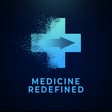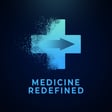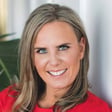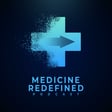Introduction to Medicine Redefined and Estanda Solutions
00:00:07
Speaker
Welcome to Medicine Redefined, a podcast focusing on helping you reclaim ownership of your health. I'm Dr. Darshah. And I'm Dr. Altima Sharaja. We're your hosts, here to challenge conventional practices and uncover the stories behind pioneers shaping the future of medicine. Our conversations not only focus on the individual level to dissect common practices for health optimization, but also zoom out to enhance systemic change. Join us as we look to break the status quo, move the needle forward, and put the help back in healthcare.
00:00:38
Speaker
Our guest today is RJ Kedziora. He is the co-founder of Estanda Solutions, a leading company specializing in custom software and data analysis for healthcare and medical companies. With a remarkable journey spanning over 30 years, he possesses a deep understanding of designing, developing, and deploying successful software projects. His extensive experience enables him to provide valuable guidance and innovative insights, resulting in cost-effective solutions that improve patient outcomes.
00:01:03
Speaker
RJ received his MBA from West Chester University and a Bachelor of Science in Computer Science from Duquesne University, where he received the Excellence in Computer Science Award. He has spoken at numerous technical and healthcare conferences on a variety of topics and written or co-authored multiple articles focused on healthcare information technology, several of which are published in peer-reviewed scientific journals.
Exploring Digital Health and AI in Healthcare
00:01:24
Speaker
In this episode, we'll touch on a variety of different topics, mainly what the difference is between digital therapeutics and digital health. We'll also talk about the current transition from the culture of patients to the new culture of being consumers. And then we'll also talk about health care and big tech. We'll talk about electronic medical records, cybersecurity, the pros and cons of AI.
00:01:45
Speaker
And last but not least, we'll also touch on what physicians can do moving forward to keep up with the trends as technology evolves. Make sure to check out the show notes because RJ will be holding a webinar on driving quality in digital health and the role of generative AI in testing, which will be held on Friday, June 14th at 12 PM. And you can find that link in the show notes. Enjoy the episode. RJ, sir, how are you?
RJ Kedziora's Journey in Digital Health
00:02:12
Speaker
I'm doing great. How are you doing, Darsh?
00:02:14
Speaker
doing well. Thanks so much for coming onto this podcast. You know, in previous episodes, we've definitely touched on digital health, digital software, but I think the angle that you provide, you know, you being kind of getting your hands dirty in this field, really working with companies to promote digital health and digital therapeutics, actually a word that I've never heard before, which I'm interested in delving into. But before we do all that, why don't you tell the listeners a little bit about yourself and how you got interested in this world of
00:02:43
Speaker
digital health, digital therapeutics, and software? Absolutely. I look forward to our conversation. One of the challenges is that the word digital therapeutics is, it's not exactly new, but newer and out there kind of thing, really trying to get the word out there. But Astenda is a company I co-founded in 2003. So we've been in the world of digital health before, it was called digital health.
00:03:12
Speaker
You know, my background, I came up with a comp side degree, software developer, hardcore coding kind of thing. And then quickly realized coding is in software development, digital health software is much more about people process than really just a code. The code, the tech is obviously very important, but there's so much more to that picture. So, you know, started working in the pharmaceutical arena and then it was like, okay, how can I do more?
00:03:42
Speaker
And with a good friend, Drew Lewis started Ascenda back in 2003 and got our start with a diabetes disease management solution for military healthcare, of all things. It was a congressional grant. Drew happened to know some of the folks at the Jocelyn Diabetes Center, who 20 years later, we are still working with today, which is, you know, long-term, you know, 20 plus year clients.
00:04:08
Speaker
That was the first probably 10 years of our existence. It was very focused on diabetes related solutions, grant-based research software with PhDs doing some R01, you know, random clinical trial, randomized clinical control trials, lots of publications.
Estanda's Expansion and Motivation in Healthcare
00:04:28
Speaker
And the second half, like the last 10 years, we've continued that focus, but also have mixed in more of a commercial
00:04:37
Speaker
flavor to it, where we do work with Fortune 50 medical device companies, some startups, other organizations, helping them develop solutions that they are taking to market or use internally in case of, you know, Jozlyn or a healthcare system where they can improve their patient's health. So it's been an amazing journey and looking forward to what the next 20 years bring. Yeah, for sure. I mean, you've been, you've been at it for quite some time and I feel like
00:05:06
Speaker
the public is now starting to get to know a lot of these companies and newer companies and other companies that fail, but we're definitely in this era where we're just seeing so much innovation with health. Is there any specific reason that brought you towards the healthcare field? It's a sense of giving back.
00:05:25
Speaker
in making a difference. I got my start really in that pharmaceutical world and could see what was possible through the drug development, but I was not the biologist, the chemist, I was the software developer. And seeing what I could do as an individual, if I could develop solutions, help other people develop solutions, then I can have a pretty big impact.
00:05:50
Speaker
on population, not just individuals on populations. And for me personally, it was just the drive to solve problems. Healthcare is perhaps the last industry to really embrace data. There's always been lots of technology in it, your MRIs and those types of things, drug development. But data is really coming into its own now. Yeah.
Challenges in Digital Health Solutions
00:06:21
Speaker
Well, let's dive right into it, right? So why are we having this podcast episode? What are some of the issues, you know, come with digital health, digital software as it continues to expand?
00:06:33
Speaker
Yeah, it has, you know, as I look at that 20 year journey that I've been on with digital health and we were lucky in that we started with military health care at the VA, the Indian Health Services, who we still also work with today. We were lucky because they had medical electronic medical record systems. So they had data and it was trying to figure out what to do with that. And it was the early stages of like,
00:07:02
Speaker
heart rate monitoring and glucose meters were definitely out there, but it was finger sticks and you don't get a lot of data from finger sticks. It hurts to prick your finger. How many times do you really want to do that? So in those early years, it's like, okay, how do we make sense of this limited data? How do we drive decisions based on this small amount of information? Fast forward. Now we're overwhelmed with data, you know, doctors, nurses, healthcare practitioners. There's just so much data you don't even know what to do with anymore.
00:07:32
Speaker
And there are still challenges in getting to that data. So now, you know, almost everybody has an electronic medical record system out there. There are laws on the books and they're starting to be enforced too around making sure those developers of medical records are sharing that information. That is accessible to individuals and other companies to be able to make sense of that information.
00:07:59
Speaker
So now as I look at digital health and those challenges and where we're going, I look at it a couple of different perspectives from the healthcare practitioner perspective, just what is available?
00:08:15
Speaker
You know, there are probably 300,000 digital health solutions out there. Dozens of different devices, wearables to measure that data. So, you know, healthcare practitioners are overwhelmed with that data. And they don't have a lot of time. You know, if I go to my practitioner kind of thing, I'm lucky to get 10, maybe 15 minutes because they're going to move to the next person, they're going to bill kind of thing. So there's definitely challenges around that.
00:08:43
Speaker
How do I use those as a health care practitioner? The availability of that data I talked about a minute ago. But then also, just from the business perspective, how do these things get paid for? How do companies, when they develop these solutions, and it can cost a lot to develop these solutions, how do you get paid and reimbursed in a way that makes it a viable business model?
00:09:11
Speaker
There hasn't been really any, when you think of startups and venture capital companies as they want to invest in a corporation, those early years are low volume, low dollars. You want to experience that hockey stick effect where all of a sudden it's going to go off through the roof and you're going to make tons of money. It doesn't really happen very often in healthcare. Solutions are very often siloed.
00:09:38
Speaker
targeted at a couple different healthcare systems and for a variety of reasons, but there's challenges there of like, how do you go through that reimbursement and make a viable business model that the venture capital people particularly are intrigued with? Yeah, this is really cool because you're in the middle of health and medicine as well as the business side when it comes to these companies, right? And so when it comes to the healthcare side,
00:10:07
Speaker
I mean, I struggle with this almost on a daily basis is when we prescribe, when we see patients, we're always told to look at the data. And I could imagine for primary care physicians who want to give the best, you know, value-based care to their patients. It's, well, which data do I sift through? What's the most important data? And then where do I source that data from? Because like you said, I mean, I can look at somebody's wearable, or I could look at a automatic blood pressure cuff. Well, which one is now starting to become more accurate?
00:10:35
Speaker
these questions start to rise in our everyday jobs. And then also from the business perspective, I'm sure you're trying to create software that captures the specific audience or maybe even a broader audience so that you can answer the right questions if you're looking at a generalized population versus a specific population for diabetes. So it's really cool that you get to be in this middle and really facilitate almost like a seesaw between the two.
Digital Health vs. Digital Therapeutics
00:11:01
Speaker
So you mentioned the word digital therapeutic. Now, is that the same thing as digital health? It's a great question. So there are probably, I think I referenced it 300,000 or so digital health applications out there. There's dozens, maybe we could count hundreds of digital therapeutic applications out there. And I think of the difference between the two types as you think about supplements,
00:11:29
Speaker
versus medications and drugs that are actually reviewed and approved by the FDA. So digital health applications are similar to supplements. There's some idea that they work, can provide benefits, but not that really conclusive evidence. Where digital therapeutics are evidence-based and have extensive clinical trials behind them, and very often,
00:11:57
Speaker
The FDA is going to review and say, hey, this is okay to sell out there. And it's about those claims that you're making as a company. If you look at the supplements, they're like, this is not intended to treat your diagnosis. And that's what a general digital health application is. But the digital therapeutic applications are intended to treat, alleviate diseases and solutions kind of thing.
00:12:21
Speaker
So it really makes it a difference. And that's as a term, it's probably 2016, 2017. There's now the digital therapeutic alliances out there to really help promote this industry. Last year, the ISO organization, which drives standard definitions of terms and things like that came out with their first officially approved definition of digital therapeutics. So it is a very new term and concept.
00:12:50
Speaker
And, you know, I talked about some of the challenges in digital health. And in my opinion, that's where digital therapeutics are trying to make a difference in trying to make an impact in the world of the healthcare. So you think about, okay, they don't have a lot of evidence. Well, digital therapeutics are, you know, evidence-based, have a lot of clinical validation behind them. So check.
00:13:13
Speaker
How do I get paid for the development of this application? And the idea is once it's FDA approved, it can be prescribed to a patient and covered by your health care insurance. So now a patient doesn't have to pay $5 a month, $10 a month for use of the app. It's going to get covered for a different price, different threshold from that insurance company. The challenge still here in the US, though,
00:13:43
Speaker
is that reimbursement. So the federal government and CMS and those guys have not set any standards or benchmarks out there yet. They basically said we're not authorized to do this at this point. There is legislation floating through Congress to change that picture to allow them to do that.
00:14:05
Speaker
But in the absence of that, some states, some health insurance systems, UPMC in Pittsburgh, Pennsylvania, they said, we're going to cover some of these as part of our health plan because we see that there is evidence that they do make a difference. So that's slowly changing.
00:14:27
Speaker
Um, you know, we're, we've got a little ways to go there. And fortunately last year, um, uh, one of the major players pair therapeutics, um, declared bankruptcy sort of put up a little fear in the industry and the insurance companies is like, Hey, if we invest money and cover this, is this company going to be around for awhile? So, you know, we're in the early stages that's going to change, um, in, in looking forward to that, to what everybody can do. And as we help people out there create their solutions. Yeah.
00:14:57
Speaker
So when you say the word digital, I immediately, what comes to mind is something on the screen, like an app, right? But like you said, there's FDA approval and treatment. Now, when I think of the word treatment, I'm thinking of someone or something actually going and making a physiological change to my body. So are there any examples of digital therapeutics that you can give? Or am I thinking of this actually, is there more to it that I'm missing?
Impact and Accessibility of Digital Therapeutics
00:15:24
Speaker
Yeah, you're on the right track. And a lot of the conditions that are treated by digital therapeutics are, you know, mental health related. So depression, PTSD, common things, anxiety, depression, pain management. And then you also get into like the chronic disease management of hypertension, diabetes kind of thing.
00:15:51
Speaker
But yeah, it's altering. I'll say, I am not a doctor. I don't play one on TV kind of thing. As we develop these solutions, we are partnering with the doctors, the nurses, the PhDs to drive these solutions. So while I love talking about them and help create these solutions, we definitely rely on the experts and the medical experts in their experience. But yeah, it's through that and games are frequently employed.
00:16:19
Speaker
particularly as these solutions are targeting younger children, is playing a game can help reduce your pain, reduce anxiety and depression kind of thing, which is crazy to think about, but it makes a difference. Yeah, absolutely. When you mentioned the mental health aspect, that's where I was like, yep, bingo. I've definitely seen that from a game standpoint for reduction of pain standpoint. And like you said, the data is there to show that, hey, we're seeing these reduction in XYZ symptoms.
00:16:48
Speaker
And so we can definitely approve these things now. So that's super cool to see. Playing a game is fun. So it doesn't feel like a treatment. I think one of those challenges in this digital health world and stuff like that, it does take an effort to do these things. You're not just popping a pill, taking a pill or a medication kind of thing. That's very easy to do. So there is more engagement that has to be done on the side of the patient to use these tools. But if it's a fun game, you're going to want to play.
00:17:18
Speaker
Yeah. And so would you say that the purpose, not the main purpose, one of them for digital therapeutics to get them on a screen is not only being more accessible, but for the fact that, Hey, there probably are less side effects. I don't know if that's something you've seen, you know, throughout your work with companies, but is that one of the aims that, Hey, we can change physiology through a screen and we were able to quote unquote biohack almost, but not necessarily biohack, but we don't have to give a pill that may have these side effects.
00:17:47
Speaker
Yeah, I think there's definitely that aspect to it. But also, from my perspective, as I got into healthcare and developing these apps and systems for different organizations, there's an obesity crisis in America. There's a mental health crisis in America. There are not enough people
00:18:06
Speaker
to be able to treat the incidents of these conditions that are out there. It's just not possible. My wife happens to be a pediatric nurse in the Greater Philadelphia area. There are available mental health professionals for children, but go to rural Pennsylvania or anywhere in rural America, it gets harder to find those individuals. Virtual visits help, but it's still, you just don't have enough people to be able to provide this care. So we can create a game
00:18:37
Speaker
Digital most people, you know more and more people have the smartphones It's a lot easier to get it into the hands of those people That's where that knowledge and the distribution of like hey these things exist has to be improved Right. Yeah, and I think it just sparked this idea or not idea this thought in me that I
00:18:58
Speaker
As technology continues to evolve in healthcare, I mean, since COVID, we've seen a big jump in healthcare providers leaving the standard model of healthcare, right? And either moving cash base or moving their practice more towards coaching or even using technology and gathering this data and then prescribing differently than they normally would. And it just makes sense when you're talking about this evolution of
00:19:19
Speaker
digital health and what it can do, right? Because there absolutely is a shortage going on and even more so now since COVID occurred. So as we move, it seems like we're having this transition from patients more towards consumers. Any thoughts on that? Anything that you have an expertise on that you can share? Yeah, I think it is definitely true. As consumers, we are becoming
00:19:45
Speaker
more used to the idea. We're expecting more of our experience because it's being led by the smartphone and the app developers out there, the technology developers, the experiences we're having in the real world. For myself, I'm coming to expect that. When I go to my provider, I want to be able to give him my wearable data and say, hey, what do you think of this? How can I live better?
00:20:15
Speaker
I talk about living to 100 with a good quality of life. It's like, okay, help me do this. How can I do this? I'm really looking forward to that. And you think about when you, from that consumer's perspective, you go to a supermarket, Target, Walmart, Acme, wherever you may go, and Acme here in the Philadelphia area.
00:20:37
Speaker
Marketers know when you walk in, you're going to turn to the left. You're going to look and buy products more that are in the middle of the shelves because that's at your online as opposed to high up or down low. So they really know how to position these products. I saw a comparison of an ad today. It was from FedEx. And they were talking about a FedEx ad without a clock or with a clock.
00:21:06
Speaker
And even though we're not aware of that clock being there, because that clock is in another ad, we respond more to that second ad. So how do we apply these principles that are very well understood in other industries?
00:21:21
Speaker
to the world of health care and really treat us as consumers. How many times do I have to provide a health care practitioner with my medical history? It hasn't changed. Are my parents still alive? Did they have cancer? Are my brothers and sisters still alive? What are their comorbid conditions? I've answered that tons of times. A lot of that information hasn't changed. So how can I make that more streamlined?
00:21:53
Speaker
What are some of the potential downfalls that you see from this. Insurgence of digital health. I mean, to me, it seems like when you, cause I never knew the difference between the therapeutic versus the health, right? And I've been engaging a lot of digital health as long as well as my co-host and so many other people I know, right? Getting a book, um, getting track of my calories.
00:22:14
Speaker
getting data left and right about my heart rate, sleep, all these things.
Privacy and Cybersecurity Concerns
00:22:18
Speaker
And that's going to force me to change my behavior somehow. So I'm truly a consumer, and I'm truly going out and buying products to enable me to reach better scores or reach better, quote unquote, health based off these apps. Are there any downsides that you see in addition to that? Or is that even a downside? Is that something that's necessary at this stage in order for us to move forward?
00:22:39
Speaker
I think we need people to push boundaries, but with that said, privacy is a major concern. You do as you develop these solutions and put them on market. It's a huge conversation we have. I talked to, I don't know how many lawyers, privacy lawyers, again, not a lawyer, don't play one on TV, but talk to a lot and okay, how can we develop this solution, get it on market and being aware of the privacy issues
00:23:06
Speaker
And everyone thinks, hip, hip, hip, hip, first, which is very important. But even if you're not interacting with health care professionals, you know, the FTC still has oversight of just privacy.
00:23:20
Speaker
And so I've had these conversations with various different startup organizations over the past. I'm like, we're just going to go direct to consumer. There's going to be no doctor involved. I don't have to worry about HIPAA. No, you don't have to worry about HIPAA, but you still have to worry about data privacy and the cybersecurity and make sure that nobody's hacking your systems and getting this data. So there are concerns of privacy. Like we said, there's an obesity
00:23:43
Speaker
issue here in America, mental health issues. There are very strong privacy reasons around that. I don't want people to know that I might have depression or when I'm applying for a job that I might have some attention deficit challenge going on. I don't want my potential employer to be able to like Google, hey, what does RJ have going on behind the scenes? So you do have to be aware of those things.
00:24:09
Speaker
But the power of the data is just, it's exponential. And that's one of the things is I talked to clients and stuff like that. Once you have this data and we can start analyzing, just light bulbs are going to go off and you're going to find all sorts of new things because data is powerful. Yeah. Not to get this too much into the weave of politics, but I don't think people realize how much data about health can be used as a weapon, right? I mean, when you can understand the countries
00:24:37
Speaker
data when it comes to health. And another company has that and they can sell that data. I mean, there's so many things that you can do, like you said, from the consumer level, for marketing these subliminal messages from just a standpoint of changing behavior. And that's something that I'm always trying to recognize. I know there's some
00:24:56
Speaker
genetic companies out there that I won't name that have been selling their data are data. If you choose to do so, sure, you get some information, but I think the data to them is more valuable than the information you're actually getting. So yeah, it's a fair point, which leads me into cybersecurity, actually. So this is something that I think we're seeing more and more.
00:25:19
Speaker
with a lot of hackers going into electronic medical records, especially at bigger health systems. What is the reason for that?
00:25:28
Speaker
that it comes down to economics. That data is valuable. Your health care is more valuable than your credit card information because of what you can go and you can use it to, you know, pretend you're an individual and get drugs prescribed, you know. So, yeah, when you look and start investigating the dark net, you know, health care data, you know, these hackers do resell that information. It's worth more than just your, you know, simple credit card number.
00:25:58
Speaker
And because it is, you know, we see more and more health systems are being shut down because of hackers, unfortunately, kind of thing, because they realize that's the importance of this. And, you know, hey, here's an opportunity, kind of thing. Cybersecurity is a ongoing challenge. It's a race. You know, there's always going to be this ebb and flow between hackers and the people trying to protect the systems.
00:26:24
Speaker
And it's one of those things when you even think of the ports of shipping coming into the country kind of thing. The hacker has to get it right once. We have to get it right every single time. So it is definitely a difficult challenge. And the industry is responding to that. The regulations here in the U.S. and abroad kind of thing are increasing.
00:26:47
Speaker
The FDA, while for a long time, was requiring cybersecurity guidance and plans, wasn't official. But now it is very much official that if you go to the FDA to get your product looked at, you have to have a cybersecurity plan. That's first step. What are you going to do to take care of cybersecurity? So the industry is responding in kind.
00:27:19
Speaker
Yeah, I think in the TV shows, when they show a hospital system getting hacked, it's always, I've got this person hostage, or I want like $10 million. But I think we now know that the data that they sell is probably worth more than that. So it makes sense what they're after. They're not just after the money, they're after the data, which leads them maybe to money.
00:27:36
Speaker
Is there anything that the consumers can do, whether it's whether they go for a doctor's visit, whether they're downloading an app that's related to fitness, anything that they can do to really secure their privacy or take certain steps? There are common sense approaches that everybody should be using, you know, passwords being the biggest one.
00:27:59
Speaker
Different sites get hacked and lists of common passwords are released. You know, it's always, you know, 12345 or my password's password. Don't do that. But what's interesting too and various different researchers have pointed this out in terms of password complexity.
00:28:17
Speaker
You know, the gobbledygook that a lot of people sort of say, oh, you use this gobbledygook, and you're never going to remember that. So you wind up writing it down, and then that becomes problematic that you're not going to remember this. Or, you know, you don't want to use the same password over and over on the same website, on different websites, because then if one's guessed, then it's going to be easy to guess those others.
00:28:42
Speaker
So a common approach I've used and like see other people, you know, the longer that password is, the better off you're going to be because, you know, computers, as they get more and more powerful, it takes less and less time for them to just hack with brute force. Try every combination of letters kind of thing. So if you can use something longer, like a phrase, you know, but not making it personal, like, you know, don't do something like my dog's name is Bob.
00:29:11
Speaker
It's a little too easy kind of thing, but use a combination of words and that you're much easier to remember and throw in some numbers and those special characters kind of thing. Do five, six words that are easy to remember for you and you're going to be better off. Be aware just when you're looking at your email.
00:29:33
Speaker
Make sure you know where that's coming from. And now text messages and video messages. It's, you know, it's particularly with the advent of AI and the ability to copy voices and things like that. You know, I'm not really fearful or in danger that I'm going to be kidnapped anytime soon. But, you know, my parents are elderly and, you know, potentially could fall victim to one of these targets where it's like,
00:30:01
Speaker
You know, Hey, we kidnapped your son RJ, you know, and they could clone my voice. Like we're sitting here on this podcast talking. So my voice is out there. Um, you know, so we have a family safe word. Like if, if I don't say this word, then, you know, it's not me, um, kind of thing to help alleviate that. So, you know, yes, I think that's a little paranoid.
00:30:24
Speaker
Um, cause I don't think I'm really going to be kidnapped or my parents really going to be, you know, the victim to this, but it is happening more and more and more. You know, it doesn't have to happen to a large number of people to make it worth the hacker's time.
00:30:41
Speaker
No, those are great strategies. And actually, the second person, I saw somebody on social media talk about having a family safe word, the word they use as pickles. But she talks about how growing up, it was such an advantage to having that. I mean, if she went over to sleepovers, she'd be able to call her parents and use this word or whatever danger she might be in, or if she felt uncomfortable.
00:31:02
Speaker
And I think you're right. I mean, we're hearing it on the news about these stories about hackers, cloning voices. I mean, there are songs out now where they're using AI of old rappers or old singers and putting them into modern day songs. So the technology out there is crazy. I'll have to find the Instagram name and I'll put it in the show notes for the listeners. But she has all these videos about how to be street smarts and how to raise a family with a lot of these key points.
Remote Monitoring and Value-Based Care
00:31:30
Speaker
So I definitely wanna come back to talking about AI, but I wanna stick to the theme of transitioning here in regards to healthcare. So one of the things I've always learned from our podcast guests is that 20% of a patient's health is due to the direct interaction of the physician itself. So in the office, the medications we prescribe, the physical exam, and 80% of it is the social determinants, everything outside of that.
00:31:58
Speaker
And so now when we get into this age of remote monitoring and when we think about value-based care, how much is this really going to make an impact towards how we take care of patients? I think there's sort of two sides to it. One, how are you going to take care of this patient and where you focus, but the other side is on that individual as well. How can they change their circumstances? And that's not always easy.
00:32:26
Speaker
But what can they change about their behavior? Social determinants of health are very wide. So what health care do you have access? What's your physical environment like? Do you live in a food desert where it's just really difficult to get good, healthy food? Those things are hard to change. And that's where as an industry, if health care continues its movement towards value-based care,
00:32:51
Speaker
then you as a physician can prescribe better food. Instead of eating the honey nut Cheerios, have an apple or an orange or eggs for breakfast, something that is healthier to eat. That's what you're prescribing as opposed to potentially a drug. It's like, okay, drugs are expensive. Everyone's now with the obesity, GLP1s, GLP1s.
00:33:18
Speaker
But they're expensive. And there's a lot of side effects. But if you can prescribe a good nutritional diet, food, you can make a difference too in the world.
00:33:29
Speaker
And yeah, so the social determinants of health and our awareness of them is going to make an impact in the industry as well. And that's where this digital health technology can really help better understand that. When you started your question with that 20%, I was thinking of how much time
00:33:50
Speaker
Do I spend in the physician's office or how much time do I spend interacting with a healthcare professional to really help me focus on improving my health and wellness? It's that other 80% that I'm out in the world on my own. And that's where that the wearables and the remote monitoring can come into play to help drive that interaction with the people that are really knowledgeable in the healthcare.
00:34:16
Speaker
Again, you get a scalability problem challenge there if I'm relying on my healthcare practitioner to always focus on that data and tell me what to do. So we really need to drive the solutions that are giving the meaningful clinical validated evidence guidelines to those patients as how do they improve their health.
00:34:41
Speaker
I was just going to ask you, do we foresee these digital therapeutic companies, digital health companies trying to partner with doctor's offices and hospitals or are they from a business perspective trying to carve out their own niche and really just retain the patient now consumer?
00:34:57
Speaker
And as you can imagine, as a continuum, there are definitely players in all of these different areas. What we have seen in the digital prescription of prescribed digital therapeutics
Integration and Reimbursement Challenges
00:35:14
Speaker
that reimbursement is challenging kind of thing and getting the word out to the providers to know that it's there to them prescribed to the patient is challenging and some of these vendors are pivoting more to a direct to consumer model.
00:35:29
Speaker
To get the word out there and make it more available cuz if the drug industry the medical industry the pharmaceutical companies have a huge industry set up around you know. Detailing the doctors and like going into the office and like hey prescribe our pill our medication you know.
00:35:50
Speaker
The digital health, digital prescription, digital therapeutic industry is much newer. It doesn't have the same kind of funding, the same kind of infrastructure. And they do partner with the pharmaceutical companies to get that word out, but it's hard to get the word out about these solutions that are cost-effective and that can scale. Gotcha.
00:36:13
Speaker
Okay, well, let's transition over to the tech that, you know, us healthcare providers work with. So there's some big, big EMRs, electronic medical records out there, systems, Epic for one, Cerner, PowerChart. But there's also some smaller ones out there too. Do we see a world where data can easily be transferred from one to the other, or even an
00:36:34
Speaker
a combined one electronic medical record where it just makes it seamless to find data from one patient to the next. I mean, today I was doing an admission. So I'm in physical medicine rehab and I have an admission coming from one hospital and two separate charts. We use Epic. I think I forget what they use over down the street, but it was impossible for me. I had to wait on a liaison to create another document
00:37:00
Speaker
And for me to look at that document in order to write my note rather than going to the original source, right? And so this is a common occurrence that most doctors, I feel like, have to deal with on the day-to-day.
Interoperability of Electronic Medical Records
00:37:10
Speaker
Is there a solution coming? What always amazes me, I was at a HIMS conference last March, a couple weeks ago, basically. There are still dozens of fax vendors
00:37:22
Speaker
that are showcasing and enhances large healthcare, IT related conference. All the vendors are there, like a thousand vendors, 40,000 healthcare. It's huge. And there's still fax vendors there. Fax is still a technology that's used, unfortunately. It is changing.
00:37:40
Speaker
You know, I have been in the industry now or 20 years now. You know, we did get our start with military health care, the VA that had those, you know, EMRs and stuff like that. But I've seen the improvements even in the technology that they're using, what the epics have been able to do and all these other vendors. It is changing. It is getting better.
00:38:02
Speaker
the information blocking regulations, the idea that you do need to share this data, that you do need to make it available, the vendors are making that possible. One of the big changes without getting too techy kind of thing, we've moved from a HL7 messaging-based architecture to a fire API-based architecture. And that's as far as tech all go, but the key to that
00:38:27
Speaker
is there are a lot more people today that understand that Fire API-based mechanism. That's what just every, you know, when you integrate, you know, mobile phone with, you know, the cloud servers or two companies are talking to each other, they're going to use an API. And so now the EMRs have those APIs, which makes it much easier to get to that data, to integrate with systems.
00:38:54
Speaker
There are a lot of challenges because even though once you do that, it's like, okay, what data is available? What API do you have available? How do I get access to that data? And it's not even like, you know, a technology problem. It's a people process problem. Okay. It's going to take me six months to talk to this hospital to get access, you know, permission to be able to use their API. Um, and then, you know, okay. 10 different hospitals have 10 different systems.
00:39:22
Speaker
And there has been a rise of vendors out there that are that middleman. So now when we help companies develop solutions, I don't have to integrate it with dozens of healthcare systems. I'll integrate it with one of these third party players and then they're doing all of that individual integration. So there are more and more solutions to help this, but still a huge challenges today in patient identification.
00:39:47
Speaker
I'm case in point. I do go by RJ, but officially Richard Kedziora. My father's also Richard Kedziora. And over the years, our data has been commingled. I'm like, oh, I didn't have that. I didn't get prescribed that medication. I just had a challenge. My daughter went to a doctor, and it showed up on my medical record. I was like, I'm not a 21-year-old.
00:40:14
Speaker
and female, but somehow they, they, you know, mess something up somewhere kind of thing. So there are, there are still challenges to overcome, you know, with that, but we'll get there, you know, look at how easy it is. I can go to anywhere in the world and use an ATM and get my money out of the bank. Yes. It's a lot easier, a lot of simpler data set. Um, but yeah, we'll, we'll get there.
00:40:42
Speaker
It was funny when I was at the VA during my intern year, one of the pharmacists mentioned like, Hey, we can go anywhere around the world and use our ATM and any bank and give you the money. Why can't we do the same thing in medicine where everyone carries a medical identification card, you go to whatever hospital, they plug it in and boom, all your data is right there saved.
00:41:00
Speaker
And I've heard artificial intelligence is at least trying to work on creating cover sheets for, for electronic medical records. And when a patient comes, you have just a timeline of maybe the last year and just the high yield points that are probably the most pertainable rather than reading, you know, 50, 60 pages. Sometimes we get with paperwork. Yeah.
AI's Role in Healthcare Efficiency
00:41:19
Speaker
Yeah. You just opened a whole nother can of worms. You got another hour to talk. It's the, it's the, you know, some people feel threatened by it.
00:41:29
Speaker
Uh, other, you know, I, I recognize and I know a lot of particularly in the healthcare professional, there is huge potential for, for the use of AI, particularly right now where we're starting to see the early use cases around efficiency and doing just, just what you said. It's like, there was so much information buried in the notes of that patient. How do I surface what is. You know, important, you know, I got the 10 minutes with this patient. Okay. What do I need to know? Okay. Here's the bullet points.
00:41:58
Speaker
What was interesting is, you know, I go to all these conferences, there's a HIMS and, um, five, uh, Health20 kind of thing in, in, there was like dozen vendors that all provided that same functionality of looking at, Oh, well, look at your medical record and we'll surface, you know, the 10 most relevant things and make it really easy for you. And then I turn around and there's another vendor doing the same thing. Like, well, what's different about you? Nobody has any answers just yet.
00:42:28
Speaker
So it is very early. I've heard some of the big industry players is like, yeah, we're still six to eight months away from like realistically using these solutions. They do have a tendency to hallucinate or make stuff up. There are.
00:42:44
Speaker
improved in ways of guarding against that and the technology is getting better. But it's interesting because it does appear very authoritative when it tells you something. So that's the question. But as a broader thing, it's interesting because a lot of these systems, I'll just broadly reference chat GPT, but across the systems,
00:43:06
Speaker
You know, they're getting better and better at passing various industry tests and certifications exams or passing the medical boards and things like that. And what I find interesting is then there's a lot of criticism of like, oh, they're just training these systems.
00:43:21
Speaker
to be able to take those tests. But you got trained to take those tests to be able to provide patient care. So why is that a bad thing? They're not giving chat GPT the answers and saying, OK, if you see this question in answer A, that's not how these things work. So as long as we have the proper respect for them, currently, I think you sort of treat it like an intern, that first year medical student kind of thing who
00:43:51
Speaker
who does have some idea of what's going on, but you want to cross-check it. You want to make sure that it is accurate, but it can absolutely help you if it can summarize a patient chart. Ambient listening, huge case now. So it can just, providers, healthcare providers are hating, yeah, I got to type all my notes into the EMR. And then you lose that interaction with the patient
00:44:19
Speaker
you know, if the tech can listen in the room and then provide, you know, the notes that then the doctor can just like check. Yes, that is accurate of what we talked. You've just saved immense amount of time. And, you know, I heard an example, you know, a lot of times this stuff, it sort of surprises you where the patient was like, Oh yeah, you know, my, my legs really hurt in the evening. And so, you know, I'll take two shots of whiskey before I go to bed so I can fall asleep.
00:44:49
Speaker
And the note that the ambient listening tech provides is not patients that I took two shots of whiskey, it's that they self-medicated. So makes that translation to more medically terms and things like that. Yeah, which is just, it's crazy. I did a webinar a couple of weeks ago about how do you use AI in product development, product management?
00:45:15
Speaker
And I had to come up with an example. And I had read a science fiction book, and one of the main characters had a fear of peanut butter getting stuck to the roof of their mouth. I'm like, OK, I'm going to use this example.
Developing Digital Therapeutics
00:45:27
Speaker
So I just go into chat TPT and help me develop an application to help people with a fear of peanut butter getting stuck to the roof of their mouth.
00:45:35
Speaker
Incentivity is like, really? That's what it was responsive. It was like, nobody does this. And it was just like, wow, OK. It was aware that that is not the normal thing. And I was like, OK, yes, this is really what I want to do. And it did. It gave me lots of good ideas and things like that about how to create an application that would help address that as a challenge. So there's those surprising moments.
00:46:04
Speaker
Yeah, it's pretty phenomenal how...
00:46:07
Speaker
quickly and how many different companies there are. I remember three, four years ago, I think talking about ambient listening company called Deep Scribe is what a lot of people were talking about like, oh my gosh, it's coming out of California and this is gonna be amazing and we won't have to hire scribes and we have a scribe in our pocket and it's gonna save so much time. And then I was just looking at it as a couple of days ago as I go into practice saying, hey, is there any products that we're gonna use? And probably stumbled across 2025 apps now that literally just do the same thing. And so what makes
00:46:37
Speaker
a digital therapeutic or digital health product like sticky what makes it attractive what makes it breakthrough compared to other products out there.
00:46:46
Speaker
Yeah, I think some of those, and we sort of have to start differentiating into buckets. I wouldn't put, well, I could call it digital health and the ambient listening and no summarization in that category. I think my thought process, digital health and more consumer patient focused, you know, providers might use them too. We've developed solutions that are providing the advice to providers to give to the patients kind of thing. But it is, I think,
00:47:15
Speaker
from a stickiness perspective, it provides something of value. So as I talk to and help startups, a lot of the startups are like, I want to analyze the data and show the provider a pattern. And you have to go beyond that today because they don't have the time. I mean, what do I need to do with this pattern? Are you going to have to provide them all sorts of training?
00:47:38
Speaker
to recognize the 10 different patterns you think are right. Oh, no. What is the next step to be able to do? Even as I look at my sleep data nowadays, I know. OK.
00:47:50
Speaker
Don't eat a couple hours before I go to bed. I shouldn't drink a couple hours. I should exercise. Okay, what next? What can you make it personal to me? And that's where I think it gets sticky, is that it can have that interaction that makes it more meaningful to me. One, reduce the burden of the disease, particularly it can diabetes and other chronic conditions. How can you make it easier?
00:48:18
Speaker
um, to live, to manage, to be healthier. And the tech is changing, evolving. I was, you know, wore some very early heart rate monitors with wires all over and it was just obnoxious to wear. Now you wear a ring of your Apple watch and it's like, okay, here's your heart rate. Here's your sleeping, you know, sleep patterns and everything. And you don't think about it anymore. It's there. Um, so yeah, those things are changing the industry and helping, helping us all live healthier on your lap.
AI, Burnout Reduction, and Efficiency
00:48:46
Speaker
So times evolve quicker now than I would say, you know, every year, every year that goes by, I feel like things are rapidly evolving. Um, physicians at some point had to transition from handwritten notes and medical charts to go to a computer, right? And that transition can be tough for a lot of people. And because that transition, a lot of physicians actually left medicine altogether. And so as we continue to build AI, as we continue to get more efficient,
00:49:10
Speaker
to have different technologies. What are some of the things that you believe physicians truly need to keep their eyes on, their ears on, need to keep learning, and what are the pain points that they should be looking out for so that they can keep up with the demands of whatever might be coming next in healthcare? The most obvious one, AI. AI is not going to replace you. People using AI are going to replace you. It's just a simple fact of the matter.
00:49:40
Speaker
the technology is advancing too fast, too quickly to ignore.
00:49:46
Speaker
And while you may not be using it in your practice day-to-day and your interactions with your patient, your patients are going to be using it every day. And they're going to be coming to you, not with the Google, hey, I Googled this. They're going to come with, hey, Google chat, chat TPT, Microsoft. Microsoft is deeply embedding AI in everything they do. Google's doing the same thing. You are not going to be able to avoid the use of it
00:50:15
Speaker
So you need as a healthcare practitioner to be aware of what's out there. What are these, you know, systems providing? So, and then how can, how can they make you, you know, more efficient? You know, there is a challenge of burnout. Okay. How can I use the AI to make my life easier? And I talk about the pajama time, you know, where you have to go home at the end of the day and finish off your notes. Okay. How can I use AI to make that easier and turn that into family time?
00:50:46
Speaker
And then you mentioned in the beginning that you work with healthcare providers, right? To gather ideas, see where the pain points are. If there are healthcare providers listening to this that are actually interested in, you know, being involved with consulting or working with someone like you, is that possible? One and two, is there certain qualifications they need and how do they actually get involved in that? Interesting question. Call us up and we can help you do that.
00:51:14
Speaker
But yeah, it's using the technology. Right today, it is simple. These systems are free, which is also amazing. They do cost an exorbitant amount of money to run on the back end, and these companies are taking that financial burden on right now. But they are free. Just use them. Start playing with them. Get
00:51:38
Speaker
familiar with them and comfortable with.
Engaging with AI for Healthcare Solutions
00:51:40
Speaker
As I've mentioned walking around in these conferences and I always ask the question, are you using chat TPT? And people are like, oh yeah, I started playing with it. I wasn't too impressed.
00:51:49
Speaker
keep at it and ask it a simple question. When you ask it a question, say, pretend you're a medical doctor, act like a medical doctor, and it'll transform the answer, you know, which simple things like that. We're talking to people that are writing articles and it's like, well, I don't really like what I wrote. Well, tell it to write as a PhD or, you know, tell it to write as Stephen King.
00:52:15
Speaker
and it will transform what it's writing in a meaningful way and it'll pleasantly surprise you probably. Yeah, for sure. I think learning the proper prompts on chat GPT has been a lifesaver for a myriad of things. So it's definitely something useful to learn is how to interact with AI like you mentioned. And so here's is an interesting thing because there is and I've done some webinars too of like prompt engineering strategies and stuff like that. But one of the interesting things you can do
00:52:45
Speaker
is ask chatgbt to write you a better prompt to get a better answer. Ask it, what does it need to know to do a better job? So now when I use, you know, various image generating AIs, you know, I don't write the prompt. I go into chatgbt and like write me a prompt to use over here to generate this image.
00:53:07
Speaker
and ask me what questions you need to know. And they'll ask me a series of questions that I just, you know, it's more conversational, um, and, and get a lot better results by using chat GPT to create a better prompt. Wow. Well, fascinating. Yeah. Now I need, I need to start doing that, but it's funny how, yeah. Chat GPT for me is replaced, um, just the basic search, you know, any search engine, um, just to get whatever answers I need and whatever.
00:53:35
Speaker
whatever ideas I need to, you know, for content. So, amazing. Well, RJ, you mentioned people can reach out to you. Where should they go specifically? I'm available on LinkedIn. It's probably an easy way. Or the Astenda website, E-S-T-E-N-D-A.com. It happens to be Portuguese for extend, trying to extend the capabilities of people, processes out there. So yeah, Astenda.com is probably the best place.
00:54:02
Speaker
We're always putting on webinars out there to try and share the knowledge, some white papers, and a bunch of healthcare conferences throughout the year kind of thing. I just did a talk on digital therapeutics in one couple weeks ago. So we're out there.
00:54:20
Speaker
Perfect. We'll definitely link those in the show notes for easy access. What's next for you? Is there anything that you're excited about? Anything upcoming? It's funny. I just spent the spring going to like six conferences in for the next three months. I don't think I'm actually scheduled to go anywhere. So it's a little quiet period in the summer, which is nice.
00:54:41
Speaker
But yeah, we're going to be at the American Diabetes Association. That's where we got our start. So we'll be there talking about some various things that we're working on, some poster presentations that we will have there, which will be nice. But yeah, exciting stuff. Looking forward to what AI can do.
00:54:59
Speaker
Yeah, I'm looking forward to it as well. So definitely exciting times ahead. Before I ask the last question, you're an Eagles fan. I'm an Eagles fan. I grew up like two seconds down the road from I guess where you are. What are your predictions for this year for the Eagles? Great all season, by the way. I was very happy with the drafts. Last year was just historically bad. So this year can only get better.
00:55:25
Speaker
Um, I have high expectations going to this year, much easier schedule, um, than last year. Last year we were, we had a lot of late night games, Monday night, Thursday night games, which just wears on yet. We don't have those this year. So yeah, I'm looking forward to a good year and, and the NFC hopefully proves true. I don't think we've had a repeat winner in the NFC East in like 20 years or something like that. Um, Eagles didn't win, unfortunately, the NFC East last year. So we're going to win it this year.
00:55:55
Speaker
Super Bowl bound and we'll go against Kansas City and we'll beat them this time. A hundred percent. A hundred percent. Yeah. I'm going to go to Tampa. So I'm moving down to Tampa for my next job from from Harrisburg here at Penn State. And so I'm going to get tickets for that Tampa Eagles game. So.
00:56:13
Speaker
Can't wait, at least in warmer weather. So, well, RJ, I appreciate you coming on here. This is always such a breath of fresh air when we get to touch on topics like this, because while it may not be, you know, specifically talking about diabetes or whatever disease process, I think it gets the listeners thoughts going. And we have a lot of pre-medical students, medical students, other people who want to learn how to use tech, but I think we're urging them in the right direction.
00:56:41
Speaker
about what's important, what to keep their eyes on, and just the evolution of the world that we're living in.
Promoting Accountability and Transparency in Healthcare
00:56:47
Speaker
So this is definitely gonna be something really important. I'm excited to see how it all transforms. But with that, how do we put the health back into healthcare? How do we put the health back into healthcare? Two things. One, we have to promote accountability. So it's not, it shouldn't be a healthcare froth.
00:57:10
Speaker
It's an individual problem. How do I as an individual become more accountable for my health care? And two, I'm fascinated by price transparency. What other industry can you say when you buy something, you have no idea how much it's going to cost you? It's a huge problem in health care. I've had my surgeries and it's like, oh, how much is going to have no idea how much is it going to cost? So if we can make that more more transparent,
00:57:37
Speaker
I think that'll transform the industry and move us more to the value-based care that we know we need to move towards to make an impact.
00:57:48
Speaker
Yeah, 100% agree. There's a book out there called The Price We Pay by Marty McCary. And it really summarizes a lot of what we talked about this podcast, but essentially the quote unquote corruption that we see in health care and where the money flows and why there is no transparency through and through. So I'll link that book as well into the show notes for the readers that are interested out there. But RJ, fantastic discussion. Appreciate you coming on. Thank you. Had a great time. Thank you. Appreciate it.
00:58:16
Speaker
An important update before you take off, we are now publishing episodes every other Monday. This will allow you to take your time listening to an episode, implement the lifestyle techniques you've learned, and solidify your knowledge with our newsletter. We thank you for your support of this podcast. If this episode speaks to you, please consider sharing it with your friends and family. We would also greatly appreciate it if you leave a rating and review.
00:58:39
Speaker
We would like to thank our team, Ethan Ju on video, Haritha Yapary on graphics, Zaina Blugmani on research, and Sarah Khan on newsletter. And as always, our disclaimer. Everything in this podcast is for educational purposes only. It does not constitute the practice of medicine and we are not providing medical advice. No physician-patient relationship is formed and anything discussed in this podcast does not represent the views of our employers. We recommend that you seek the guidance of your personal physician regarding any specific health-related issues.
00:59:07
Speaker
Once again, thanks for listening and we'll see you at the next episode.


















